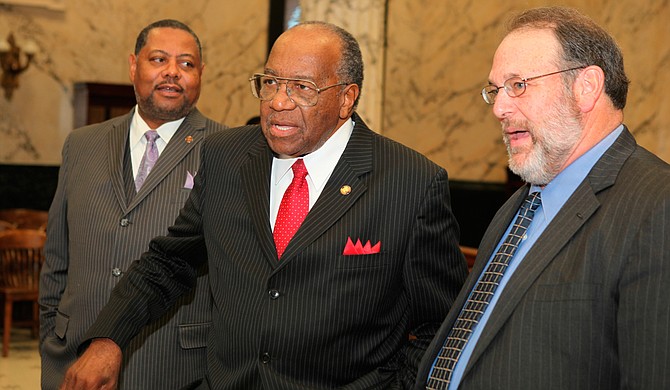Sen. David Jordan, D-Greenwood, said African American lawmakers are willing to block future appointments to the state college board unless Gov. Phil Bryant addresses their concerns about the board’s lack of diversity. Photo courtesy Amile Wilson/File Photo
Mississippi lawmakers voted Monday to borrow $450 million for a range of needs. As usual, there's very little for the city of Jackson's legislative agenda, which included funding for public-safety, payment-in-lieu of taxes for state buildings and other requests. House and Senate members passed Senate Bill 2906, which contains $250 million in borrowing. The House also gave final passage to House Bill 1630, which calls for another $200 million in borrowing to be repaid by casino taxes, mostly for bridge work.
Projects in Jackson that did receive funding include $8.5 million for Jackson State University for campus buildings, $20 million for the Mississippi Civil Rights Museum and Museum of Mississippi History, $10 million for New Mississippi Trade Mart and renovations to the Mississippi Coliseum, $6 million for Blair E. Batson Children's Hospital expansion and $1 million for the Jackson Zoo.
House Ways and Means Committee Chairman Jeff Smith, R-Columbus, admitted those were probably the "most critical" unmet needs. But, warning that Lt. Gov. Tate Reeves would not budge past the total amounts in bills, Smith argued that attempts to change the bill as Monday deadlines approached could endanger the chance of any borrowing.
In 2012, Reeves torpedoed the typically annual ritual of state borrowing, and Smith said he didn't want to risk lawmakers going home in an election year without a bond bill.
Mississippi's budget writers said over the weekend that the state's overall budget will go up by more than 2 percent, for a total budget of about $6.3 billion. Precise figures remained unavailable Saturday, even as a deadline passed for agreement between House and Senate negotiators. Including fees, gas taxes and federal aid, Mississippi spends more than $20 billion a year.
— Associated Press reports
Black Lawmakers Frown on IHL Shenanigans
While the contract dispute over Ole Miss Chancellor Dan Jones has dominated the news, another debate involving the State Institutions of Higher Learning flared, but barely got any attention.
On March 26, the Mississippi Coalition on Black Higher Education and members of the Legislative Black Caucus met to discuss what they called the lack of diversity on the IHL board. This year, board member Bob Owens' term expires. A graduate of Jackson State University, Owens has been the only representative on the board to have graduated from one of the Mississippi HBCUs connected to the 1975 Ayers lawsuit over segregation in state schools.
"For the first time in 50 years, (HBCUs) will not have a voice on the IHL board," Sen. Kenneth Wayne Jones, D-Canton, said. "We feel like it is disrespectful. We feel like it is disgraceful to overlook such a segment of the community that pays taxes—that (has done) everything they were supposed to, who were educated at these universities—to not be on that board."
Because of the controversy over education funding, representation on the IHL board is important to ensuring that the needs of all universities are met, the groups' members argued. Preston Lee, MCBHE's first vice president, believes that the problem of representation on the board is also about school pride.
"This is about passion for your university," Lee said. "...When it comes down to the issue, I think people are going to have a passion for (their) university. (When funding comes up,) I think you are always going to give the benefit of the doubt to your school."
Lee and other members of the two groups want a more representative college board. JSU graduate Sen. David Jordan, D-Greenwood, added that Legislative Black Caucus members are prepared to vote against all three pending nominations.
"Whether they believe it or not—understand it or not—we represent one million people," Jordan said. "To not include us in appointments ... to leave out members of the HBCUs ... is disgraceful and shameful, and we're not happy about it.
"We want (Bryant) to go back to the drawing board and do it over ... because we are all part of Mississippi."
— Zachary Oren Smith



Comments
Use the comment form below to begin a discussion about this content.